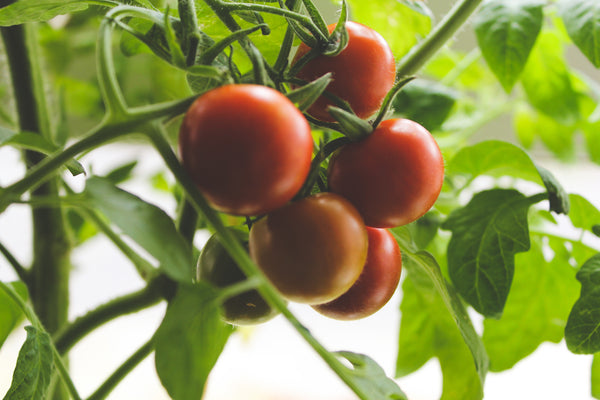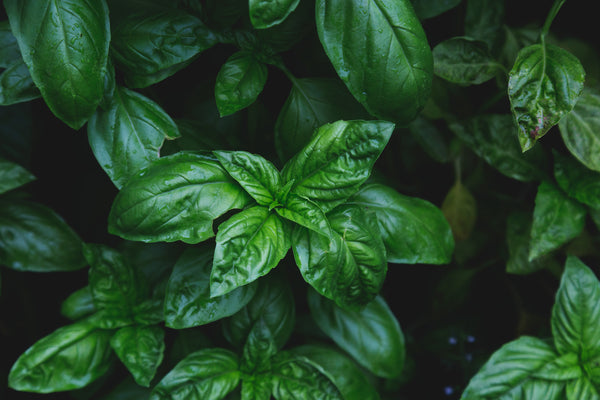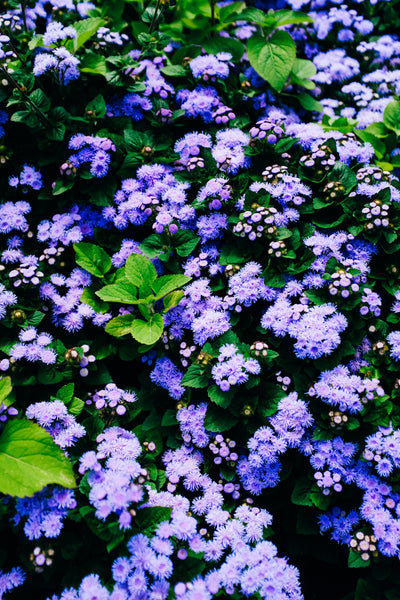Garlic is an excellent herb to grow in your garden. It is a relatively carefree plant and has few pests or diseases. Because the bulb is located so close to the surface, only shallow cultivation can be practiced. So plant in an area as free of weeds as possible. A mulch of leaves or other material free of weeds seeds will help garlic to grow hassle free.

Most planting is done in October and even in September in early winter areas. Garlic planted too late in the fall will not have good root growth and will get off to a slow start in the spring. The site where the garlic is planted should be in full sun and in a light, humus-rich soil that drains well. The soil should not be too acidic or too fertile. To much nitrogen causes heavy top growth and, especially in the spring, delays bulb formation. If your pH is below 5.5, the addition of wood ash or dolomite lime helps.
Break apart the bulb without peeling off any of the skins. Plant the individual cloves 10cm (4 inches) apart and about 5cm (2 inches) deep with the pointy side up.
Planting depth depends on your winter weather. If you will get a lot of rain or repeated frost heaves, plant deeper so the developing plant is not uprooted during the winter. Shallower planting may be useful if root rot has been a problem for you, this way the bulb develops during the summer above ground. To maximize bulb size, cut off the scapes (the curling tip) just as they begin to curl. (They are wonderful in stir fries!)
Garlic matures between the end of July to early August. Avoid watering for a few weeks before harvesting to allow the bulbs to cure. Harvest when 1/2-3/4 of the leaves have turned yellow (depending on variety). Try to avoid puncturing the bulbs when digging them out. Remove any dirt by hand, leaving as much of the skin intact as possible. Cure the bulbs in a single layer in a warm spot for 1 week to 10 days. Then clean them off again and cut off the stems and leaves of the hardneck varieties. If you are going to braid the leaves of the softneck, clean them up now.
Store in a cool, dry, well-ventilated space. Do not store in the refrigerator. Refrigeration will induce sprouting, changing the garlic’s texture and flavour.
Set aside your best bulbs for planting in the fall. Use any damaged bulbs first, Store the best.
Rocambole (Allium ophioscorodon) is a very pungent variety with large cloves and light purple skin. It is a hard neck type, also known as ophio garlic, which forms a flower head that should be cut off so that energy is not directed out of the edible bulb. This variety of garlic is best planted in the fall in rich soil that was well fertilized in the summer. Hardnecks have the tendency to split open if left in the ground too long.
Rocambole Varieties
(Allium ophioscorodon)
Italian Hardneck
This one hits the top of the charts when it comes to yields. White skinned with just a blush of pink, this garlic makes big cloves, which are easy to peel. The taste is a medium hot, true garlic flavor that lasts for a long time. Under proper conditions it will store 9 months to a year. Very cold tolerant.
Red Russian
Red Russian handled a very wet winter and spring better than the Spanish Roja variety. It has substantial bulbs with purple-streaked wrappers that peel easily. This type is quickly becoming a popular gourmet garlic in high demand. It is recommended primarily for areas with winters, not for hot climates that do not experience winter temperatures. Stores for 4-6 months.
Musica
Bulbs in this organically grown hardneck garlic are 4-6cm (11/2-21/2″) in diameter and can be even larger when well grown. These cold-hardy plants have a rich and strong flavour. There are usually siz to eleven cloves per bulb, which peel easily.
Persian Star
Persian Star is a one of a kind garlic with beautiful lavender striped bulbs and crescent moon shaped cloves. It’s a great all around garlic, and perfect for roasting and spreading on bread, or minced raw in salads and oils. It is moderately spicy with a smooth garlic flavour.
Softneck Variety
(Allium sativum)
Italian Softneck
Cloves Per Head: 8 to 10
Softneck varieties are not as fussy about how they are planted. Because the “stem” is flexible it is not as important to set the cloves with the pointy end up. (That is why this type is grown and harvested by machine for the grocery stores.) They store better and longer than the Hardneck types. One way to store them is in braids to hang in a cool, dry, well-ventilated space. There are many cloves in each bulb so separate them carefully trying not to dislodge the wrapper on each bulb. If the wrapper comes off accidentally, use that clove in the kitchen.
For additional information, we recommend the Garlic book “Growing Great Garlic” by Ron Engeland.



